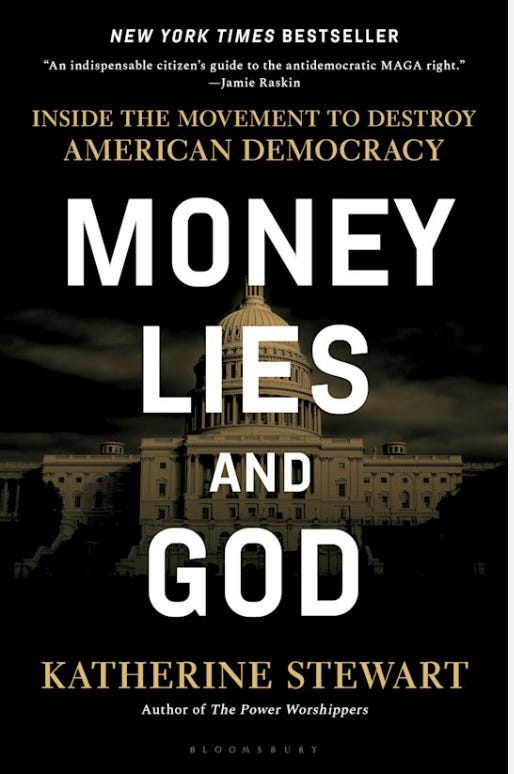Katherine Stewart’s Money, Lies, and God is another in a long list of books setting out to describe, understand, and perhaps warn the rest of us about Christian nationalism. It’s not even Stewart’s first effort. Her previous book, The Power Worshippers (2020), traced the rise of Christian nationalism and became the book on which the documentary God & Country, produced by Rob Reiner, was based.
Money, Lies, and God goes beyond The Power Worshippers and attempts to describe the right-wing “movement to destroy American democracy.” One service Stewart provides in her most recent book is to describe this movement in detail, dividing it helpfully into five main categories: Funders, Thinkers, Sergeants, Infantry, and Power Players. Her extensive research is supported by nearly 70 pages of notes and citations.
Stewart maintains that this movement, now the animating force behind the second Donald Trump administration, “fundamentally does not believe in the American idea,” but instead subscribes to the notion that the country should be dedicated to “a particular religion and culture” under which “certain kinds of Americans” (white, male, Christian, and conservative) have “a right to rule” and the rest of us “a duty to obey.” Along the way, Stewart finds within the movement “rank misogyny,” which Christian leaders, she writes, prefer to call “male headship.”
Perhaps most frightening—in a book of frightening details—the movement does not have a specific platform (though the Heritage Foundation’s Project 2025 comes close). Instead, she writes, the movement is “best understood in terms of what it wishes to destroy.”
What gave rise to this movement? As Stewart sees it, a combination of economic pain and cultural grievance over several decades. Today, though, it has become a loosely organized, but generously funded movement with quite a mixture of voices, leaders, podcasters, and influencers lined up, for now at least, under the MAGA banner and the current president.
The movement speaks the language of democracy, according to Stewart, but practices the authoritarian politics of coercion and exclusion. What the members of the movement share, she writes, is an attitude of “reactionary nihilism.” Tolerance and pluralism have been for them a catastrophic change to their preferred political order. Reactionary nihilists presume a world that is “devoid of value, impervious to reason and governable only through brutal acts of will.” Stewart rarely minces words.
I found a chapter on the Claremont Institute to be particularly helpful. Not just a right-wing think tank, Claremont Institute publishes the increasingly influential Claremont Review of Books, intentionally patterned after the left-leaning New York Review of Books. The Claremont Review has long been critical of the “administrative state,” for example, which early actions of the Trump administration seem designed to dismantle. Stewart’s chapter on the Claremont Institute also examines the influence of the political philosopher Leo Strauss and the Nazi jurist Carl Schmitt.
Stewart’s book is relatively new but has already been widely reviewed—in publications as diverse as The New York Times, The Washington Post, and Foreign Affairs.
Is the book an attempt to engage the Right in a reasonable discussion? No, writes Stewart, though she claims to have approached her subject with an open mind. Instead, the Right seeks to “demolish the very possibility of reasonable discussion,” treating politics as an extension of war by other means.
This book is not for the faint of heart, but then neither is the current political climate.
Katherine Stewart, Money, Lies, and God: Inside the Movement to Destroy American Democracy (New York: Bloomsbury Publishing, 2025)
Hey, how about those numbers for my new book! An audio version, in production now, will be available next month.







Great review, Doug! I concur with Linda. Long life experience has shown me the “reasonable discussion” is not on the menu…
Thanks for sharing this review, Doug. The book, as you suggest is not for the faint of heart, but, this line: "the Right seeks to “demolish the very possibility of reasonable discussion,” " releases me from the impulse to read the book and frees me from the compulsion to try to have a reasonable conversation with any one from that unreasonable right.